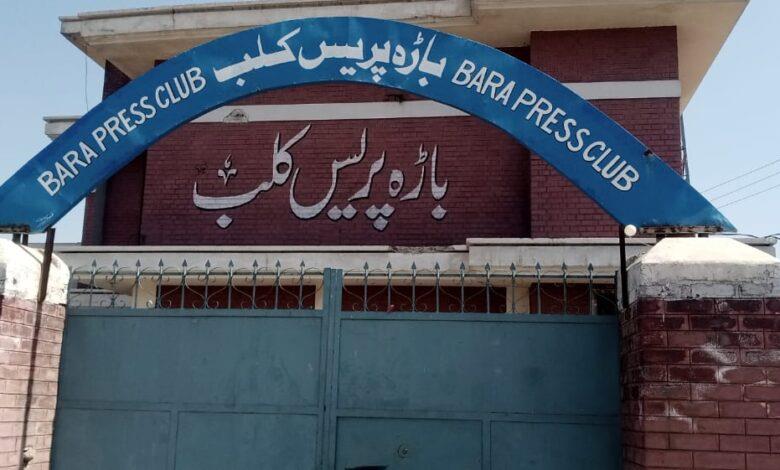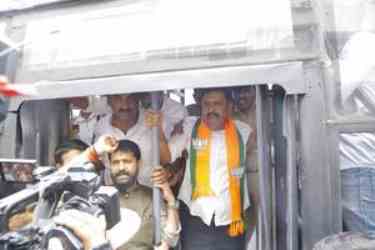
Bara Journalists' Dedication Amid Adversity: A Testament To Community Resilience
However, the post omitted the hotel's name, prompting some local youths affiliated with political parties to take to social media, unleashing threats against the journalists and even advocating for dire consequences, including violence. The journalists were subjected to derogatory remarks, while a few journalists retaliated with rhetoric of their own.
Most residents of Bara, including journalists, were displaced during the war on terror. Upon their return after 7 or 8 years of displacement, they found the state of journalism, along with the press club, in dire straits.
Journalists pooled their resources to revitalize the press club, investing personal funds in essential amenities such as water, electricity, and refurbishments. Subsequently, elected representatives like MNA Iqbal Afridi and various social organizations contributed significantly to the club's renovation.
Despite the challenges, journalists in Bara have rendered invaluable services amidst professional and personal adversities. Tragically, two journalists lost their lives in bomb blasts during duty, while two others passed away in service, with their families yet to receive government support.
Also Read: Deadly Attack in North Waziristan Claims Lives of 7 Soldiers
Currently, the Bara Press Club boasts 24 permanent members, with numerous others applying for membership, reflecting a resilient spirit in the local journalism community.
The formal repatriation of IDPs to Bara commenced in 2015 after their eviction on September 1, 2009. Upon their return, residents, including journalists, encountered various hardships, exacerbated by the merger of erstwhile FATA with Khyber Pakhtunkhwa.
Despite ongoing challenges, journalists played a pivotal role in shedding light on these issues, prompting action from elected officials, albeit with many problems persisting.
Upon returning to Bara, residents grappled with severe infrastructural damage, including the destruction of houses, educational institutions, hospitals, markets, and roads due to the war on terrorism. Journalists collaborated with the local business community to assess the damage, advocating for swift government compensation through initiatives like the“Afridi Relief Committee.”
Furthermore, journalists extensively covered the rehabilitation efforts in Bara Bazaar, highlighting issues such as water scarcity and the relocation of Bhatta Tal Bazaar in Peshawar district, shedding light on the discriminatory practices by the Peshawar Police against local traders.
They also reported on the contentious crushing plant industry on Besai Baba Hill, documenting protests by tribesmen and the government's controversial plans to build a restaurant, showcasing the journalists' unwavering commitment to their community.
Amid scorching August heat, the alleged killing of a teacher named Irfan in Bara stirred outrage, prompting a 26-day protest where his body was kept, drawing participation from leaders of major political parties and local representatives. Bara journalists dutifully covered the protest, showcasing their commitment without seeking personal gain. In recognition of their efforts, JUI's local leader Alhaj Shamsuddin Afridi rewarded the journalists of the Press Club with Rs 20,000.
Subsequently, Bara witnessed protests against various incidents, including the alleged suicide of 23-year-old Shahzeb in Peshawar's police Station, the martyrdom of laborer Bilal Afridi in Takhta Baig, and several other tragic events. Bara journalists diligently covered these protests, demonstrating their dedication to their profession and community.
Amid scorching temperatures, Bara journalists reported on peace marches organized by the Bara political alliance, despite facing challenges such as fainting due to heat exhaustion and theft of personal belongings. They also covered the Tirah Aman March without compensation, incurring substantial personal losses.
Additionally, journalists played a crucial role in reporting on the month-long operation to retrieve the body of three-year-old Yahya from a deep well, providing continuous coverage and support to the affected community.
During power outages in Bara Bazar, journalists documented protest sit-ins at the Grid Station and Khyber Chowk, even amidst continuous rainfall. Following the return of IDPs and the merger of FATA with Khyber Pakhtunkhwa, Bara journalists actively identified and addressed numerous issues, including infrastructure challenges, educational initiatives, and societal concerns.
Despite facing irregular salaries and adversity, journalists remain dedicated to highlighting community issues, even at personal risk, as evidenced by a recent incident where a journalist was arrested by the police while performing his duties.
It is crucial for the public, including political, social, and business leaders, to support journalists in Bara rather than subjecting them to insults, threats, or violence. Such solidarity is essential for community development and ensuring a balanced and informed society.
Failure to cooperate with journalists could stifle progress and silence voices, hindering the realization of a truly developed and equitable society.
Note: The organization does not necessarily agree with the blogger's opinion.

Legal Disclaimer:
MENAFN provides the information “as is” without warranty of any kind. We do not accept any responsibility or liability for the accuracy, content, images, videos, licenses, completeness, legality, or reliability of the information contained in this article. If you have any complaints or copyright issues related to this article, kindly contact the provider above.






















Comments
No comment